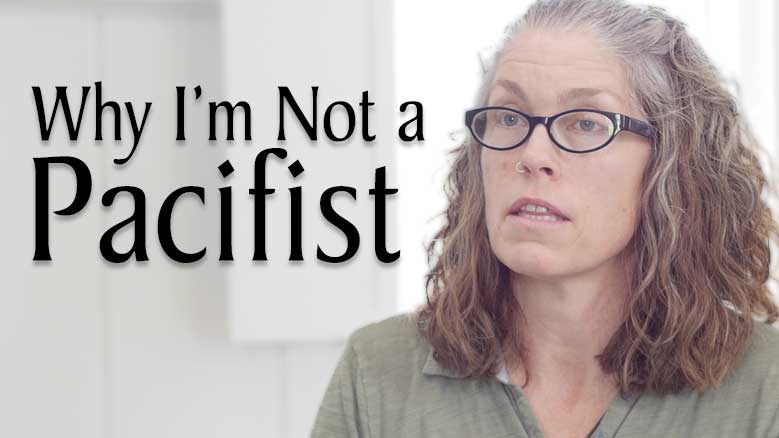William Hanson’s excellent article "Police Power for Peace"
(FJ Aug. 2004), brought to mind the thinking and views of George Fox on the use of violence by the state. Many Friends may be surprised to learn that although George Fox was a personal pacifist—he would not bear arms, and he (along with 11 others) declared in the Peace Testimony of 1661 that Friends, as individuals, would not bear arms and engage in war—he does not appear to have been an absolute pacifist with respect to his views concerning the use of violence by the state to police and to engage in war.
Following September 11, 2001, I was all shook up about the Peace Testimony. I kept thinking: What about thugs and innocent victims? What about Adolf Hitler, Pol Pot in Cambodia, Saddam Hussein’s murders, Rwanda, the ethnic cleansing in Kosovo? What about the human rights of victims? What about a terrorist with a nuclear weapon heading toward Manhattan? What about UN peacekeeping forces that use guns? What about humanitarian interventions? How can you have law without the other part—law enforcement? Doesn’t violence, or the threat of violence, sometimes stop violence instead of begetting more violence? Aren’t some wars truly policing actions? September 11, 2001, drove this writer to learn more about the Peace Testimony.
I started to hit the books, searching for my religion’s answer to these questions. Philadelphia Yearly Meeting’s Faith and Practice had one line on police activities, which seemed to gloss over the whole topic. Then I read about George Fox and the Peace Testimony.
Now William Hanson’s article leads me to want to share what I had learned about George Fox and the Peace Testimony—to provide some historical perspective that might be useful to Friends. Here is what I learned:
Several historians have described George Fox’s views in the ten-year period leading up to the famous Peace Testimony declaration of January 1661, and subsequently. In First among Friends, historian H. Larry Ingle writes: "He [George Fox] also indicated that while he was personally opposed to participation in war, he recognized and accepted the authority of the state to use the sword. It was, he wrote, ‘a terror to the evil doers who act contrary to the light of Lord Jesus Christ.’ ‘The magistrate,’ he said bluntly, ‘bears not the sword in vain.’ Hence Fox was not a pacifist in the modern sense that he utterly rejected participating in all wars and violent conflicts. He could not imagine himself bearing the sword, at least under present circumstances—he spurned a ‘mortal crown’ like the one some wanted Cromwell to put on—but he also recognized that someone must wield the sword against evildoers."
In another passage, H. Larry Ingle writes: "As far as is known, Fox did not encourage his followers to join the army; but many of them cooperated with it in one capacity or the other, and he did not rebuke them for their efforts."
A third passage: "In a historical sense, the declaration [Peace Testimony declaration, 1661] represented a major shift from the position Fox had articulated since 1650. While in Derby jail, he specifically exempted himself from participation in wars when he rejected a request from a group of soldiers that he take a captaincy. He quoted the apostle James that wars and fighting grew from lust, and he told them that he lived in the state that took away the occasion of war. His position thus remained a personal one and was never used to judge his followers. . . . He did not deny, and never would deny, the right of a nation’s rulers to wield weapons in the defense of a just cause."
And the fourth passage: "Fox remembered the declaration [Peace Testimony] as one ‘to clear us from plots and contrivances.’ His recollection underscores the context for the statement, a period during which Quakers aroused such official suspicion that they were set upon and abused while doing nothing more unusual than going to the market. But what was written for the nonce became a standard summary of Quaker practice."
In The Quaker Peace Testimony, 1660 to 1914, historian Peter Brock wrote: "He [George Fox] urged the English armies to subdue not only Spain and the Papacy, but France and Germany and the Turks. . . . The most warlike of Fox’s utterances are probably those contained in a pamphlet he addressed early in 1659. . . . Here Fox accuses the army of unfaithfulness to their divine mission for not carrying war into the heartland of Spain and into Italy as far as Rome, so as to destroy the Inquisition in those lands, as well as for not bringing the Turks to Christianity and rooting out their idolatrous practices by similar means."
In another passage, Peter Brock wrote that following the Peace Testimony declaration in 1661, "Fox continued to stress that Friends believed that the magistracy was ordained by God. The law of the state, enforced by the magistrates’ sword, curbed the evildoings of ‘the unrighteous.’ So long as Caesar did not restrict religious truth but kept within the proper secular sphere, he must be honored and obeyed. ‘Caesar’s weapons,’ he wrote in 1679, ‘are for the punishment of the evildoers and for the praise of them that do well; for which he is to have his tribute, his custom, his due.’"
My guess is that George Fox would be very supportive of the ideas in William Hanson’s article "Police Power for Peace." I think George Fox would also be sympathetic with Edmund Burke’s famous statement: "All that is necessary for the triumph of evil is that good men do nothing."
As for me, I pray for peace, and for the police and soldiers who risk their lives protecting me.
John Spears
Hopewell, N.J.


